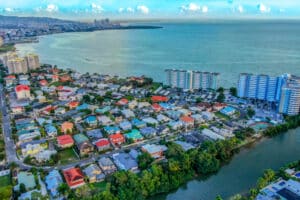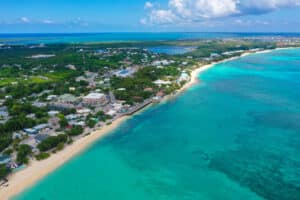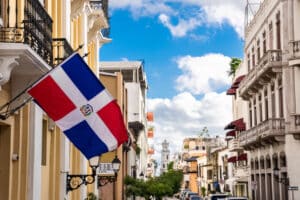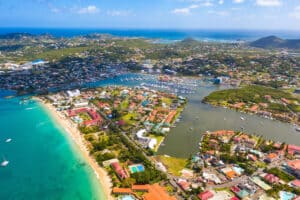The Bahamas is a postcard-perfect paradise, but from June 1st to November 30th, tropical storms and potential hurricanes can stir things up.
Some hurricanes unleash their destructive strength over wide areas, while others bring only rain. The intensity, size, and movement of hurricanes means that some Bahamian islands may not even feel a breeze!
This year’s Atlantic hurricane activity brings reassuring news for the Bahamas, as forecasts reveal that activity is close to normal, with just two hurricanes and one tropical storm as of October 2023.
But to give you the full picture, we’ll do a deep dive into the natural phenomenon of hurricanes. We’ll explore past storms, pinpoint the most vulnerable areas, and arm you with safety tips and tricks if nature shows its fierce side during your vacation.
Before you head over to the Bahamas, here’s your essential hurricane season guide.
Dodge the Storm: When Is the Bahamas Official Hurricane Season?
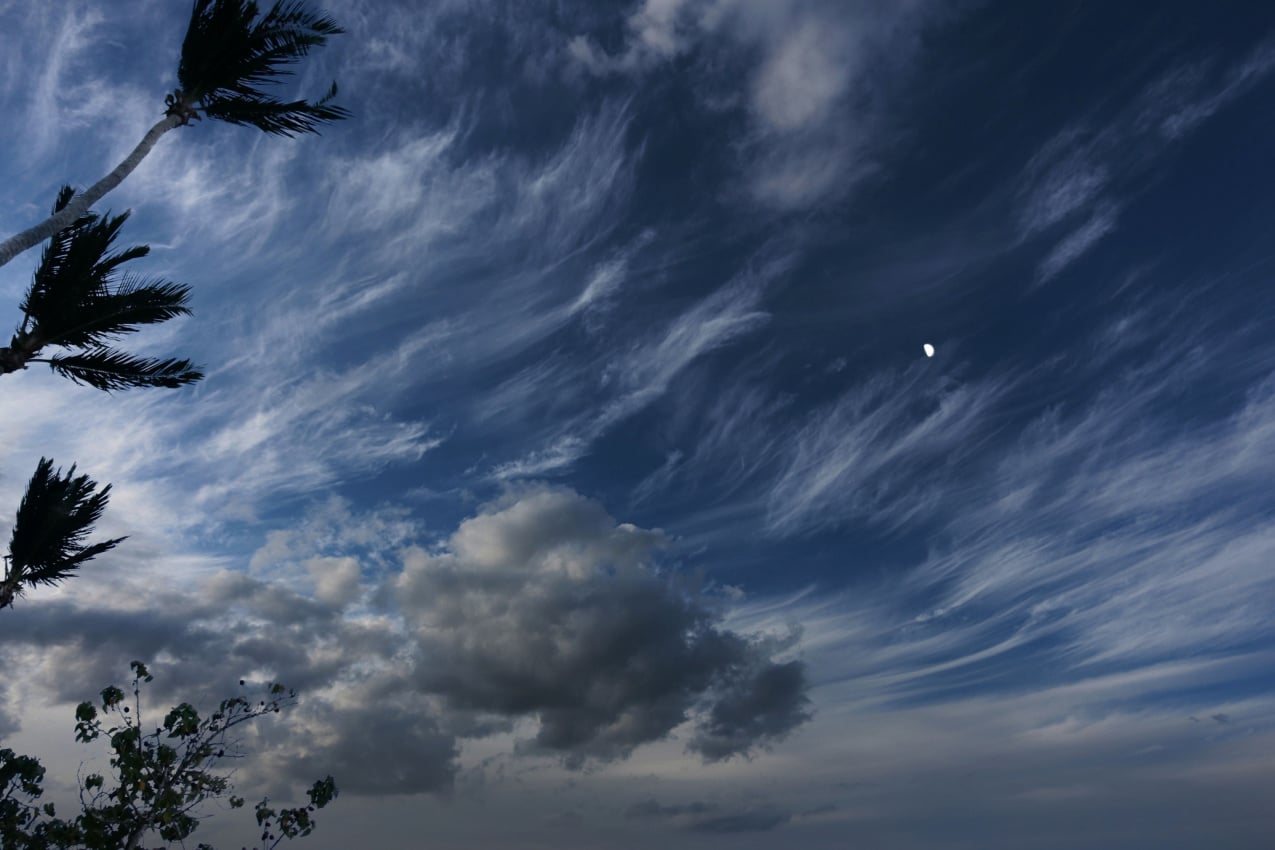
The Bahamas is undoubtedly one of the best places to visit in the Caribbean. And most tourists choose to explore this island outside of hurricane season.
Hurricane season in the Bahamas spans from June 1 to November 30, with August, September, and early October holding the highest risk. But hurricanes don’t always follow this schedule, as May can also host a surprise storm.
So, what’s the best time to avoid hurricanes? That would be the Bahamas’ dry season, which spans December to April. During this time, the skies are clear, there’s hardly any rain, and there’s next to no chance to witness a hurricane. So if you are looking to avoid hurricanes and rain altogether, these months offer a near-100% storm-free experience.
Atlantic Hurricanes: How Do These Storms Really Form?
Hurricanes in the Bahamas form in the Atlantic, where the water temperature is warm and fueled by wind disturbances in Africa.
Here’s the science: when the warm waters of the Atlantic reach 80°F (26.67 °C), they evaporate, creating moist air that rises into the atmosphere. As it ascends, the air begins to cool and condense into liquid droplets — giving birth to those towering storm clouds.
Next, the African winds come into play, spinning the storm clouds into a swirling cluster across the ocean. When those winds reach a sustained speed of 74 mph (119 km/h) or more, the natural phenomenon is officially labeled as a hurricane.
Understanding Hurricane Power: The Saffir-Simpson Hurricane Wind Scale
Once a hurricane is fully developed, meteorologists use the Saffir-Simpson Hurricane Wind Scale to scale the strength and intensity of the hurricane. The categories are as follows:
| Category | Wind Speed mph/km/h | Damage at Landfall |
| 1 | 74-95/119-152 | Minimal |
| 2 | 96-110/154-177 | Moderate |
| 3 | 111-129/178-207 | Extensive |
| 4 | 130-156/209-251 | Extreme |
| 5 | 157/252 and above | Catastrophic |
NOAA 2023 Hurricane Season Forecast: What Lies Ahead in the Atlantic?
According to the National Oceanic Atmospheric Administration (NOAA), forecasters are predicting near-normal hurricane activity in the Atlantic for the year 2023.
Their early-year predictions estimated a range of 12 to 17 total storms with winds of 39 mph/ 62 km/h or higher within the Atlantic. Among these, 5 to 9 were anticipated to develop into hurricanes, with winds reaching 74 mph/119 km/h, or more.
So, what does the current situation say? As we approach the end of the year, the Bahamas suffered a total of two hurricanes and one tropical storm. Let’s have a look at the details:
| Name | Date | Category | Wind Speed | Affected Areas |
| Franklin | Aug 18 to Sept 1 | Category 4 | 149 mph/241 km/h | Inahua Mayaguana |
| Idalia | Aug 24 to Sept 2 | Category 3 | 120 mph/194 km/h | 221 mil (356 km) northeast of West End (West Grand Bahama) |
| Ophelia | Sept 21 to 24 | Tropical Storm | 68 mph/111 km/h | North Abaco |
Side note: While researching the 2023 hurricane season in the Bahamas, we also had a glimpse of the 2022 hurricane season, which painted quite a different image. In 2022, the Bahamas experienced eight hurricanes, two of which occurred at the start of the hurricane season, in May and June.
What we can conclude from this is that 2023 witnessed a significantly lower number of hurricanes that clustered around the same time, in contrast to 2022, when they were spread throughout the season. With just one month left in hurricane season, let’s keep our fingers crossed for a smooth November without any unforeseen surprises, so we can wrap up the season on a positive note!
Navigating Hurricane Season in the Bahamas: Safety Tips and Tricks
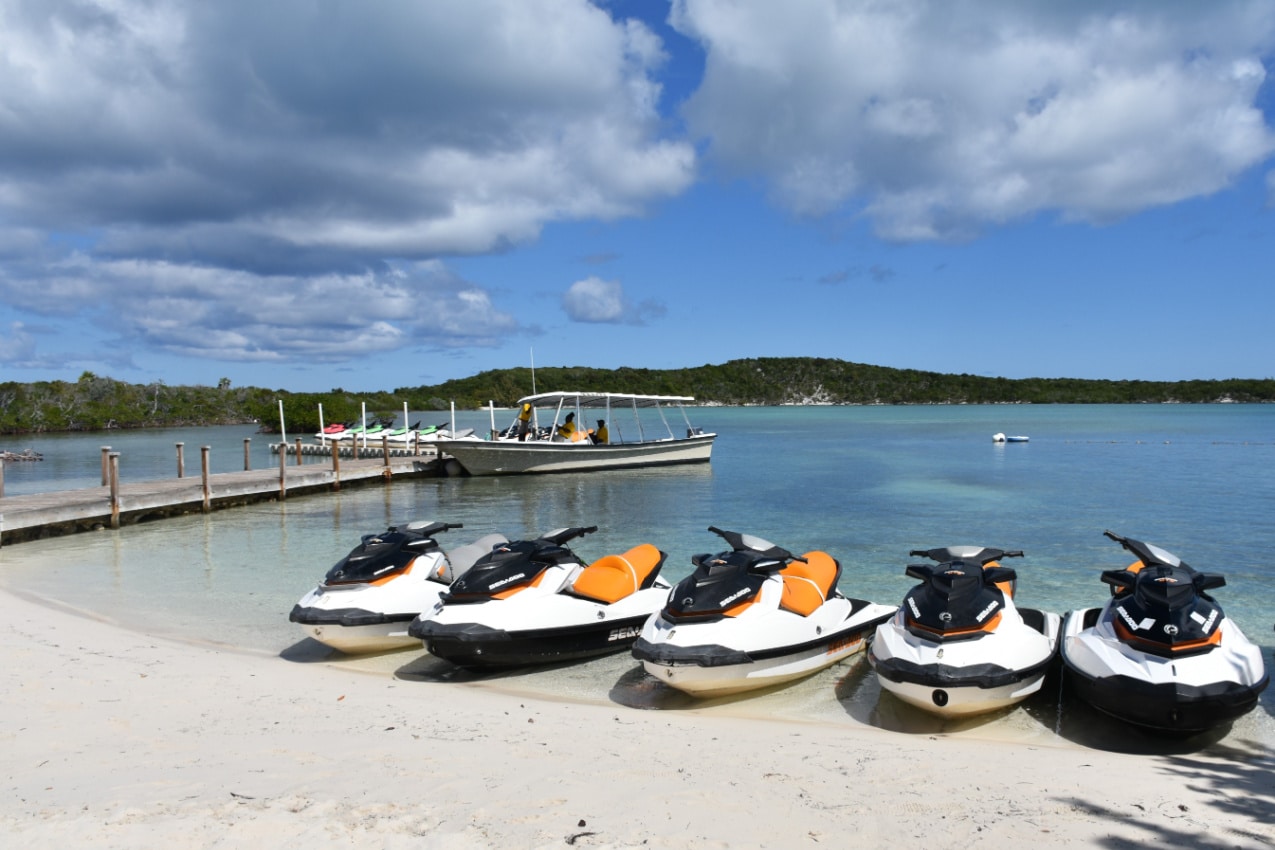
Even though hurricanes don’t frequently strike the Bahamas, it is always a good idea to be prepared for the possibility of a storm disturbing your vacation plans. Let’s look at some useful safety tips and tricks.
1. If You Want to Dodge Any Likelihood of Storms, Book a Vacation Outside of Hurricane Season
While this tip might appear quite evident, scheduling your vacation outside of hurricane season can save you the hassle of dealing with rain, storms, and evacuation plans. However, if you’re determined to experience the Bahamas during hurricane season, it may be better to steer clear of August, September, and October, when hurricane activity tends to peak.
2. Purchase Travel Insurance to Cover Hurricane Expenses
When you’re planning a trip during hurricane season, it’s a smart move to get travel insurance. Travel insurance can help you if your trip gets canceled and covers any potential medical expenses, including emergency evacuation. According to Forbes, the average cost of travel insurance for a Bahamas trip is $188, and even though it may seem a bit pricey at first glance, it will definitely come in handy if a disaster does happen. Plus, it’s hard to put a price on peace of mind.
3. Stay Up-to-Date With Weather Forecasts Once You Land in the Bahamas
After you arrive in the Bahamas and your vacation begins, it’s a good idea to keep an eye on the weather. You can do this by downloading trustworthy weather apps or tuning into local news channels. To check the weather in the Bahamas, you can use TheWeatherChannel, and if you want to track hurricane activity, WeatherBug is a great tool. This can help you stay prepared and make the most of your trip.
4. Book at Hotels Constructed to Resist Severe Storms
When planning a trip to the Bahamas, it’s smart to pick hotels or resorts that are well-prepared for severe weather. So before you book your dates, get in touch with the hotel staff and ask about their hurricane evacuation plans. Most hotels should have an emergency plan in case a natural disaster happens, including evacuation shelters, backup generators, food, bottled water, and first aid supplies. Still, it’s better to ask and be 100% sure you’ll be protected in case something happens.
5. If a Hurricane Is Sure to Hit, Book a Flight and Leave as Soon as Possible
If the authorities issue a definite hurricane warning, act quickly and secure your airline ticket back home as soon as possible. Airports will be closed during a hurricane strike, so waiting too long could mean getting stuck in the middle of the storm. You can also contact the hotel’s staff to ask for some compensation for the missed vacation days, and even if you can’t get a refund or alternative compensation, don’t take unnecessary risks. Your safety comes first, so leave while you still can!
6. During a Hurricane, Staying Inside Is a Must
If you weren’t able to leave the Bahamas before the hurricane hit, it’s crucial to head to emergency shelters as fast as possible. If you’re stuck in your room during the hurricane and are unable to reach the shelter on time, it’s very important to stay indoors and keep away from all windows and glass doors as they might break from the strong winds. The safest places for you during a hurricane are interior rooms. If you’re in a multi-story building, go to the ground floor because higher floors are more exposed to strong winds.
7. Don’t Go Outside Unless the Authorities Say It’s Safe to Do So
The tricky thing about hurricanes is that there may be a temporary lull in the winds and rain, making it seem like the storm has passed. However, in a few hours, the storm could return with full force. So, even if it appears as if the storm has moved on, don’t rely on your personal judgment. Until you get official confirmation that the storm has completely passed your area, it’s crucial to stay in your shelter.
8. Be Patient and Don’t Panic
Yes, natural disasters can happen, and they might disrupt your vacation. But what matters most is your safety. So staying calm during a hurricane is crucial because it helps you make clear-headed decisions. Stressful situations can cloud our judgment, so keeping a level head is essential.
Patience is also key. You might be stuck in an evacuation shelter until the storm passes, and your electronic devices may not have fully-charged batteries to keep you entertained. In times like this, it’s important to be patient and find other activities to pass the time, like playing cards, drawing, or reading a book.
FAQ
When considering past hurricane occurrences, the islands at the highest risk of hurricane impact are Central Abaco, Andros, East Grand Bahama, and West Grand Bahama.
However, there’s no region entirely immune to the impact of these storms. Hurricanes are unpredictable, but based on their geographical locations and past experiences, these are the areas you should definitely reconsider visiting, especially if you go to the Bahamas during hurricane season.
The earliest recorded hurricane in the Bahamas is the 1926 Nassau hurricane, also known as the San Liborio hurricane. It made landfall in the Bahamas on July 22, 1926, as a formidable Category 4 hurricane. This hurricane left a trail of destruction, particularly impacting the Bahamian capital Nassau on the island of New Providence. Tragically, it resulted in the loss of 106 to 146 lives.
The main difference between these terms is that they each refer to a different stage of the same natural disaster’s evolution.
For instance, all hurricanes start out as tropical disturbances, which is when the warm ocean air evaporates and forms a cluster of storm clouds. This is the earliest sign of a possible hurricane observed from a satellite.
When the storm clouds reach a defined wind circulation of 39 mph (63 km/h) or below, they evolve into so-called tropical depressions. In this phase, the storm clouds are well-defined and start to move in a given direction.
When the wind’s speed reaches or exceeds 39 mph (63 km/h), the tropical depression evolves into a tropical storm. This is when the nearby areas may start to experience heavy rainfall and wind.
When the storm’s winds reach a velocity of at least 74 mph (119 km/h), then it’s officially labeled a hurricane — the final and most intense stage. Hurricanes feature a distinct eye in the center, which results from the powerful wind circulation within the clouds.
When hurricanes make landfall (hit the coast), they unleash destructive winds, intense rainfall, flooding, and landslides, causing severe damage to coastal structures.
Not every tropical disturbance progresses to the hurricane stage. It takes a certain sea temperature and wind speed to reach that level. So, when you hear that a tropical disturbance has formed in the Atlantic, don’t be overly concerned just yet. It could remain a disturbance and not become a hurricane at all.
Similar to tropical disturbances, a Category-1 hurricane doesn’t guarantee it will inevitably evolve into a destructive Category-5 hurricane. Furthermore, if a hurricane makes landfall on one Bahamian island, say on New Providence’s Nassau, it doesn’t mean it will cause the same degree of damage on the other islands, as well. Each hurricane is unique – some islands may face a direct hit, while others might only be exposed to the outskirts of a storm.
Meteorologists rely on weather satellites to provide early warnings about potential hurricanes.
These satellites are called GOES-R series (Geostationary Operational Environmental Satellites-R Series) and they continuously monitor the hemisphere every couple of minutes, reporting conditions that might result in a hurricane. So once a hurricane emerges, the meteorologists use the satellite’s data to keep us informed about the storm’s strength and whether it’s growing in intensity on its way to the Bahamas.
Yes, there are tons of shelters across the islands to safeguard you from severe hurricanes. These shelters provide both locals and visitors with critical supplies and temporary lodging. If you want to learn more about safety shelters, here’s a full list of where they are in the Bahamas.
The US Embassy in the Bahamas advises tourists to bring the following items to a hurricane shelter:
Water, milk, and beverages
Canned foods
Medical kit
Toilet paper
Flashlight
Important documentation
Blankets and sleeping bags
Portable ice chest (cooler)
Baby food and diapers
Battery-operated radio
Eating utensils
Blankets or a sleeping bag
Something to keep you entertained: cards, books, etc.
The US Embassy in the Bahamas warns people to be extremely cautious when leaving the shelter once the hurricane has passed. There may be live electric wires down, and some structures may be physically unstable.
Additionally, it might take a while for local supplies to be deemed safe for consumption, so rely on your hurricane kit for food and drinking water for a few more days.
Eventually, airports will reopen, allowing you to return home, but it’s essential to be patient and adhere to guidance from local authorities. Stay within your shelter until the authorities say otherwise.
Yes, the hurricane season in the Bahamas is often the most budget-friendly time to visit. Due to the potential for storms, hotel rates, flights, and tours in the Bahamas tend to be much more affordable during this period. Also, the crowds are reduced during these months, making it ideal for travelers who are not only budget-conscious but also prefer a more relaxed, crowd-free atmosphere.
If there’s a hurricane prediction for the Bahamas, flights will be canceled, hotels will be closed, and you’ll receive a refund unless the hotel’s and airline’s terms and conditions say otherwise.
If the flights and hotels are still operating, but you’ve changed your mind about traveling to the Bahamas during hurricane season, contact your airline and ask whether you can change your flights to a later date for no additional fee. As for your hotel, unless you paid a nonrefundable rate, you can generally cancel a booking within 24 to 72 hours of your stay, but it’s always better to contact the hotel’s staff to double-check whether that’s possible.
Key Takeaways
Are you ready for your Bahamian getaway? Let’s summarize what you need to know about hurricane season there.
When: Hurricane season stretches from June 1 to November 30, with the risk peaking in August, September, and early October. Keep an eye out for potential storms in May, too.
How They Form: Hurricanes start as tropical disturbances and can progress to tropical depressions, storms, and hurricanes. They’re ranked from Category 1 (weakest) to Category 5 (most powerful).
The Good News: Not all disturbances become hurricanes, and not all hurricanes become category-5 monsters. Destructive hurricanes are rare in the Bahamas. In 2023, the islands had only two hurricanes (category 3 and 4) and one tropical storm. So things are looking good!
Stay Prepared: Stay updated with weather forecasts, keep tabs on hurricane reports, and remember our tips for future reference.
Safe travels!
